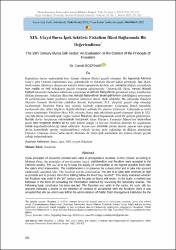| dc.contributor.author | Bozpinar, Cumali | |
| dc.date.accessioned | 2023-09-01T10:20:14Z | |
| dc.date.available | 2023-09-01T10:20:14Z | |
| dc.date.issued | 27.03.2022 | en_US |
| dc.identifier.citation | Bozpinar, C. (2022). XIX. Yüzyıl Bursa İpek Sektörü: Fiskalizm İlkesi Bağlamında Bir Değerlendirme . Afyon Kocatepe Üniversitesi Sosyal Bilimler Dergisi , 24 (1) , 201-212 . DOI: 10.32709/akusosbil.870226 | en_US |
| dc.identifier.uri | https://dergipark.org.tr/tr/pub/akusosbil/issue/69100/870226 | |
| dc.identifier.uri | https://hdl.handle.net/11630/10460 | |
| dc.description.abstract | Kapitalizm öncesi toplumlarda bazı iktisadi zihniyet ilkeleri geçerli olmuştur. Bu kapsamda Mehmet
Genç’e göre Osmanlı toplumunda iaşe, gelenekçilik ve fiskalizm ilkeleri kabul görmüştür. İaşe ilkesi,
üreticisinden tüketiciye ulaşmasına kadarki bütün aşamalarda devletin sıkı müdahaleciliğiyle piyasalarda
ham madde ve mal bolluğunun geçerli olmasına çalışılmasıdır. Gelenekçilik ilkesi, mevcut iktisadi
faaliyet düzeninin muhafaza edilmesine çalışılması ve iktisadi faaliyetlerde geleneksel işleyiş kurallarının
dikkate alınmasıdır. Fiskalizm ilkesi ise, iktisadi faaliyetlerde devlet gelirlerinin olabildiğince arttırılması
ve gerilemesinin önüne geçilmesi amacının izlenmesi olarak ifade edilebilir. Bu çalışmada fiskalizm
ilkesinin Osmanlı Devleti’nde yürütülen iktisadi faaliyetlerde XIX. yüzyılda geçerli olup olmadığı
incelenmiştir. İnceleme Bursa ipek sektörü özelinde yoğunlaşmıştır. Çalışmada ikincil kaynaklar
incelenerek elde edilen bilgilerin değerlendirilmesi şeklinde bir yöntem izlenmiştir. Çalışmada şu temel
sonuca ulaşılmıştır: Fiskalizm ilkesi XIX. yüzyılda Bursa ipek sektöründe geçerli olmuştur. Şöyle ki XIX.
yüzyılda Bursa yöresinde ipek vergisi hasılatı fiskalizm ilkesi kapsamında artan bir gelişim göstermiştir.
Burada devlet borçlarının ödenmesinde harcanmak üzere Düyun-u Umumiye İdaresi’nin tasarrufuna
geçen ipek vergisinin devlete ait bir gelir kalemi olduğu ve böylece fiskalizm ilkesinin bir uygulaması
olarak değerlendirilebileceği kabul edilmiştir. Ayrıca aynı dönemde yörede üretimi yapılan ham ipeğin
devlet kontrolünde tartılıp vergilendirilmesi yoluyla devlete gelir sağlandığı da dikkate alındığında
Düyun-u Umumiye İdaresi’nden önceki dönemde de Bursa ipek sektöründe söz konusu ilkenin geçerli
olduğu anlaşılmaktadır | en_US |
| dc.description.abstract | Some principles of economic mindset were valid in precapitalism societies. In this context, according to
Mehmet Genç, the principles of provisionism (iaşe), traditionalism and fiscalism were accepted in the
Ottoman society. The iaşe is to try to keep the supply of commodities at the highest possible level with
the state's strict intervention. The traditionalism is to preserve the current order and to take into account
traditionally accepted rules. The fiscalism can be expressed as “the aim is to raise state revenues as high
as possible and to prevent them from falling below the level they reached". This study examined whether
the fiscalism was valid in the 19th century and focused on Bursa silk sector. In the study, a method was
followed in the form of evaluating the information obtained by reviewing the secondary sources. The
following basic conclusion has been reached: The fiscalism was valid in the sector. As such, silk tax
amounts followed a course in the direction of increase in accordance with the fiscalism. Here it was
accepted that silk tax which was left to the administration of Public Debt Management Institution for the payment of the debt of the Ottoman State was a state income and could therefore be considered as part of the fiscalism. Moreover, considering that the raw silk produced in the region was taxed and provided
income to the state, it is understood that the fiscalism was valid in the period before Public Debt
Management Institution. | en_US |
| dc.language.iso | tur | en_US |
| dc.publisher | Afyon Kocatepe Üniversitesi | en_US |
| dc.identifier.doi | 10.32709/akusosbil.870226 | en_US |
| dc.rights | info:eu-repo/semantics/openAccess | en_US |
| dc.subject | Bursa | en_US |
| dc.subject | İpek | en_US |
| dc.subject | XIX. Yüzyıl | en_US |
| dc.subject | Fiskalizm | en_US |
| dc.subject | Silk | en_US |
| dc.subject | 19th Century | en_US |
| dc.subject | Fiscalism | en_US |
| dc.title | XIX. yüzyıl Bursa ipek sektörü: Fiskalizm ilkesi bağlamında bir değerlendirme | en_US |
| dc.title.alternative | The 19th century Bursa silk sector: An evaluation in the context of the principle of fiscalism | en_US |
| dc.type | article | en_US |
| dc.relation.journal | Sosyal Bilimler Dergisi | en_US |
| dc.department | Seçiniz | en_US |
| dc.authorid | 0000-0001-8760-5253 | en_US |
| dc.identifier.volume | 24 | en_US |
| dc.identifier.startpage | 201 | en_US |
| dc.identifier.endpage | 212 | en_US |
| dc.identifier.issue | 1 | en_US |
| dc.relation.publicationcategory | Makale - Ulusal Hakemli Dergi - Başka Kurum Yazarı | en_US |



















